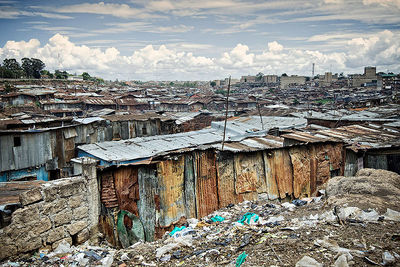imported>Chunbum Park |
imported>John Stephenson |
| (121 intermediate revisions by 5 users not shown) |
| Line 1: |
Line 1: |
| == '''[[Karl Marx]]''' ==
| | {{:{{FeaturedArticleTitle}}}} |
| ----
| | <small> |
| {{Image|Karl Marx.jpg|right|200px|Karl Marx.}} | | ==Footnotes== |
| '''Karl Marx''' (1818-1883) is generally thought of as the co-founder, with Friedrich Engels, of the political movement known as [[communism]]. He made historically significant contributions to the intellectual disciplines of philosophy, economics, politics and historicism. Of his many written contributions to those disciplines, the best-known is the 3-volume Das Kapital, and he was co-author, with Friedrich Engels, of the Communist Manifesto. Their slogan "workers of the world unite" became the rallying calls for revolutionary movements including Russia's Bolshevic Revolution of 1917 and the Chinese Revolution of 1949; and Marx's advocacy of "from each according to his ability, to each according to his need" has been the inspiration of communist parties throughout the world.
| |
| | |
| ==Overview== | |
| Karl Marx underwent a transition from academic theoretician to political activist - leaving an influential legacy in both fields. As a
| |
| student of [[philosophy]] he accepted the tenets of traditional [[humanism]], but he later developed his own interpretation in which religion is a response to hardship, and one that is destined to survive until its cause is removed. He sought an explanation for working class hardships in the theories of [[History of economic thought#Classical Economics|classical economics]] and developed his own analysis which concluded that [[capitalism]] deprives working people of all of the fruits of their labour beyond the amounts necessary for their subsistence. His analysis of historicism led him to the conclusion that capitalism contained the seeds of its own destruction, and that its overthrow would happen first where the development of capitalism was most advanced. His political theories were concerned with the processes by which capitalism could be replaced by a system governed by the principle of "from each according to his ability, to each according to his need". As a political activist, he played a major part in the promotion of [[communism]], and was a founder member of the Communist League (later to become the Communist International). His intellectual legacy was globally influential despite the development of a consensus among academic economists that his economic analysis was flawed. His political proposals were taken up and developed by Lenin and others, and were the inspiration of Russia's Bolshevic Revolution and of communist revolutions in China, Cuba and elsewhere.
| |
| | |
| ''[[Karl Marx|.... (read more)]]''
| |
| | |
| {| class="wikitable collapsible collapsed" style="width: 90%; float: center; margin: 0.5em 1em 0.8em 0px;"
| |
| |-
| |
| ! style="text-align: center;" | [[Karl Marx#Footnotes and references|notes]]
| |
| |-
| |
| |
| |
| {{reflist|2}} | | {{reflist|2}} |
| |}
| | </small> |
Latest revision as of 09:19, 11 September 2020

The Mathare Valley slum near Nairobi, Kenya, in 2009.
Poverty is deprivation based on lack of material resources. The concept is value-based and political. Hence its definition, causes and remedies (and the possibility of remedies) are highly contentious.[1] The word poverty may also be used figuratively to indicate a lack, instead of material goods or money, of any kind of quality, as in a poverty of imagination.
Definitions
Primary and secondary poverty
The use of the terms primary and secondary poverty dates back to Seebohm Rowntree, who conducted the second British survey to calculate the extent of poverty. This was carried out in York and was published in 1899. He defined primary poverty as having insufficient income to “obtain the minimum necessaries for the maintenance of merely physical efficiency”. In secondary poverty, the income “would be sufficient for the maintenance of merely physical efficiency were it not that some portion of it is absorbed by some other expenditure.” Even with these rigorous criteria he found that 9.9% of the population was in primary poverty and a further 17.9% in secondary.[2]
Absolute and comparative poverty
More recent definitions tend to use the terms absolute and comparative poverty. Absolute is in line with Rowntree's primary poverty, but comparative poverty is usually expressed in terms of ability to play a part in the society in which a person lives. Comparative poverty will thus vary from one country to another.[3] The difficulty of definition is illustrated by the fact that a recession can actually reduce "poverty".
Causes of poverty
The causes of poverty most often considered are:
- Character defects
- An established “culture of poverty”, with low expectations handed down from one generation to another
- Unemployment
- Irregular employment, and/or low pay
- Position in the life cycle (see below) and household size
- Disability
- Structural inequality, both within countries and between countries. (R H Tawney: “What thoughtful rich people call the problem of poverty, thoughtful poor people call with equal justice a problem of riches”)[4]
As noted above, most of these, or the extent to which they can be, or should be changed, are matters of heated controversy.
- ↑ Alcock, P. Understanding poverty. Macmillan. 1997. ch 1.
- ↑ Harris, B. The origins of the British welfare state. Palgrave Macmillan. 2004. Also, Oxford Dictionary of National Biography.
- ↑ Alcock, Pt II
- ↑ Alcock, Preface to 1st edition and pt III.
